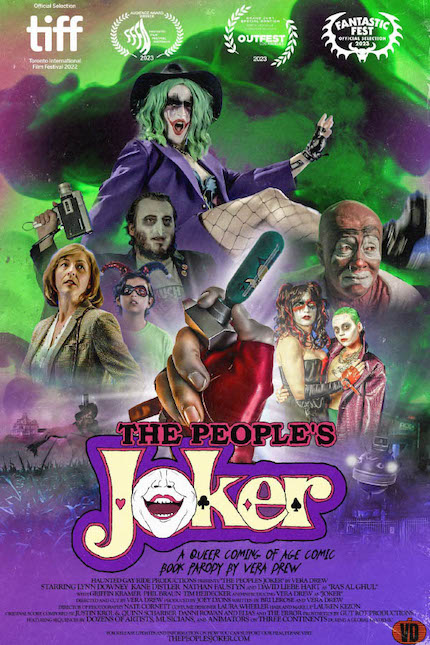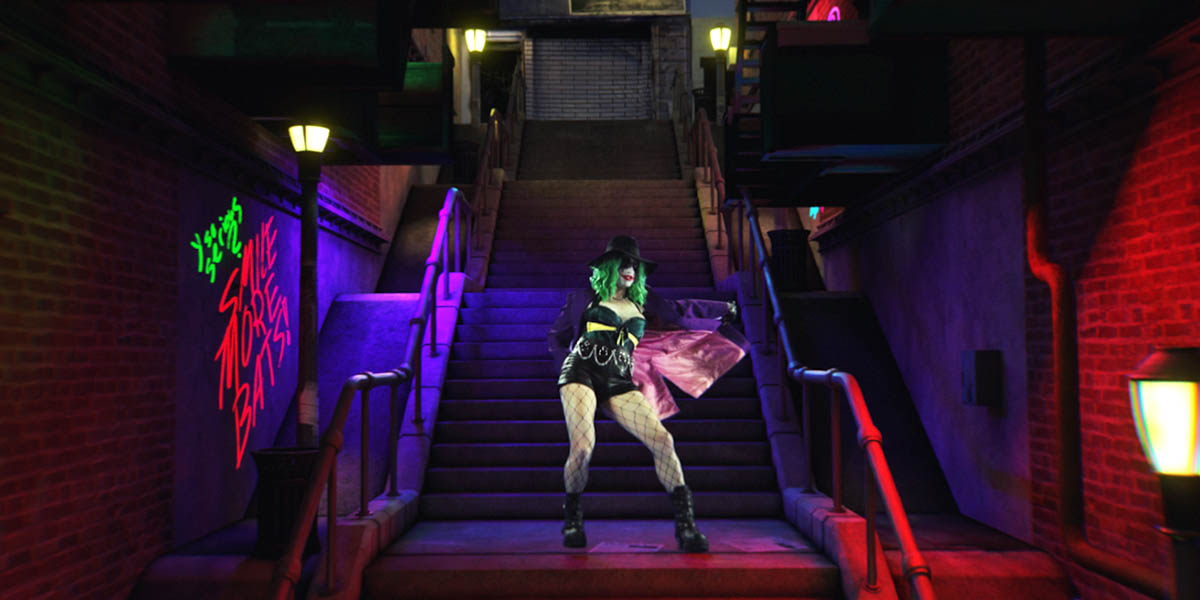Chicago 2023 Review: THE PEOPLE'S JOKER, The Most Creative and Affecting Comic Book Movie You'll Ever See
Vera Drew stars in and directs the alt-comedy.

It makes perfect sense that writer/director/effects artist/star Vera Drew doesn't want to rewatch The People’s Joker anymore.
Drew has spent upwards of three years with the film now, since its beginning as a re-edit of the 2019 film Joker, through the legal battle that saw the film pulled from TIFF more than a year ago and premiering in the U.S. at Outfest this July. But more than the exhaustingly long road to getting the film in front of audiences, she cited that it’s hard to watch because it’s so personal when introducing the film at a Chicago International Film Festival Screening.
It doesn’t take long to understand why Drew would want to give herself some space from the film. More than a fictional, narrative autobiographical film using characters from the DC comics universe, The People’s Joker feels like an autobiography in video essay form in its opening moments. Joker the Harlequin (Drew) speaks directly to camera, introducing the life of a tween boy who doesn’t quite feel like a boy in midwestern Smallville (a fictional town in the DC universe) and the mother who is quick to criticize.
Joker tells us that when the tween asked the mother (Lynn Downey) about being born in the wrong body, mom responded by getting a prescription to Smylex, a drug that temporarily makes the bad thoughts go away, or at least forces face muscles to smile. During these years, the tween finds solace in UCB Live (UCB stands for United Clown Bureau, of course), a comedy show aired from Gotham. And when they’re old enough, the boy moves to the big city to try to make it in comedy.
After the move, the film shifts into a more conventional narrative form with fewer sidebars from the narrating Joker, making them both funnier and more affecting when they do appear. We see the pre-transition Joker decide against participating in the explicitly propagandistic UCB Live training program (the only way to perform comedy legally) and instead form an outlaw “anti-comedy” group with several other comedy outcasts.
There she falls in love and gains the confidence to transition. But her relationship grows sour as her boyfriend, the transman Jason “Mr. J” Todd (a fantastic Kane Distler) is unable to acknowledge anything outside himself. From here, the film grows into a shockingly grounded drama, with conversations that feel painfully real and are brought to life without any hint of melodrama from Kistler or Drew.
“Shocking” less because this is a comic book movie (we’ve seen those go serious before) or because it’s a comedy (dramedies have lured audiences in with humor to shift into seriousness halfway through for decades) but because the visual world of The People’s Joker is infinitely silly. The film intersperses scenes in various forms of animation, including 3D, hand-drawn, flash, stop-motion, and claymation between the live action scenes. The live action scenes aren’t left out of the fun though; they play out in front of various backgrounds created on green screens which similarly alternate in their composition between miniatures, static drawings, and incredibly artificially rendered 3D "sets."
The People’s Joker doesn’t just offer an endless parade of art styles, though, it also mixes them together in several scenes. Some characters, including Batman (Phil Braun) and Lorne Michaels (Maria Bamford) are entirely animated; the former in two dimensions, the latter in three.
It’s a testament to Drew and the many, many visual effects artists and animators who worked on the film that these elements’ interactions are mostly smooth and believable. It’s an even greater testament to Drew’s script and direction, and the performances from the entire cast, that the visual onslaught (complimentary) does not distract from the emotional power of the film, but somehow bolsters it.
The only place The People’s Joker sometimes falters is its comedy, which makes sense for a film so explicitly about comedy and the people who create it. Characters often are too self-consciously trying to be funny, and you can feel that same impulse coming from the film itself, especially when jokes Drew is clearly proud of are repeated a few too many times.
It’s far from a failure as a comedy, as jokes move between laugh-out-loud funny, chuckleworthy, and too-niche for all audiences to understand, but that hit and miss quality of the humor is noticeably at odds with a film that’s otherwise near perfect. There’s nothing like The People’s Joker, and there probably never will be, which just makes it all the more necessary; and whether Vera Drew can ever watch it again or not, I’m grateful she’s gifted something so maniacally magical to the world.
Read more about the film at the official Chicago International Film Festival site and the film's own official site.
The People's Joker
Director(s)
- Vera Drew
Writer(s)
- Vera Drew
- Bri LeRose
Cast
- Vera Drew
- Griffin Kramer
- Lynn Downey









